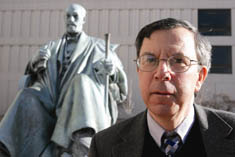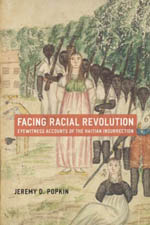 The Internet has grown so useful and powerful in such a short period of time that people sometimes never question the endless information it unfurls to its captivate audience. As a professor at a university, Jeremy Popkin is already all too aware of that issue, but he never imagined that the issue would abruptly come crashing through his door.
The Internet has grown so useful and powerful in such a short period of time that people sometimes never question the endless information it unfurls to its captivate audience. As a professor at a university, Jeremy Popkin is already all too aware of that issue, but he never imagined that the issue would abruptly come crashing through his door.
“We were all stunned,” Popkin began, as he explained his initial response to the accusations that the University of Kentucky had dropped its Holocaust course.
The false e-mail messages began in April of 2007. The Daily Telegraph in London had published an article online about a national commission recommending the best ways to teach difficult subject matter like the Holocaust. Another article in the Telegraph said a school in Birmingham, England, had dropped the Holocaust class out of fear that it would incite anti-Semitic comments from Muslim students.
The rumors then worked their way to Kentucky, when those stories circulated on the Internet, and the abbreviation for the United Kingdom (UK) was mistaken for the “University of Kentucky.”
Suddenly, the university had to be on the defensive and set the record straight, and Popkin was thrust into the middle of the melee. “It’s been a chance to realize how much it matters that I teach this course. I have not received nearly as much email as the President, Provost or Dean, but it has been eye-opening.”
While Popkin said that while the University of Kentucky is “hardly a center of Holocaust studies,” he stressed that he and other faculty members have been teaching about it for many, many years, and the only complaints he’s had about the class before the rumor hit town was from students that didn’t like their grade.
That quickly changed as furious emails wanted answers to why the university would act so irrationally and irresponsibly. “I tried to respond to all those that were serious inquiries,” he said, understanding that taking the time to set the record straight was clearly becoming imperative. “A few have come from Holocaust deniers, and I don’t respond to them.”
The fallout of the entire episode hasn’t carried an entirely negative spin, and the lessons that have come out of this cyberspace gaffe seem valuable to Popkin.
“I’ve looked it as a teaching moment; an opportunity to publicize what we do here – not only me but other faculty members concerning the study of genocides and the Holocaust.”
When the New York Times came to his class earlier this year to cover the story, Popkin’s students also took notice “I hope they were impressed with the seriousness of it,” he said.
When the photographer took photos of the students along with full-scale notes on what everyone was wearing to identify them, the class had a first-hand account of the media frenzy. Needless to say they were disappointed when the story appeared and the sole photo was of the teacher.
The biggest lesson to learn not only for students, but everyone involved, was the volatility of information on the Internet and how people choose to do process it and share it.
“People don’t know how to use it very critically,” Popkin said of the Internet as a news source.
“We’re constantly telling students why we don’t accept Wikipedia as a source for research papers explaining the difference between academically respectable sources and other means. It’s tough to make that point,” Popkin said. But, he knows an ordeal like this can expose students to the importance of proper research techniques.
One concern on campus after the rumor spread was of great concern to Popkin. “The rumor blamed the Islamic community for these protests, and there’s been no involvement at all from the Islamic community. We work with our colleagues in Islamic studies and I am personally very pleased that the university now offers courses in that area and whoever is spreading this false allegation it’s simply not true.”
That’s the delicate part of Internet media having very few boundaries and the ability to travel worldwide instantaneously. There are religious groups, nations, and people that are at odds, and rumors, blame and finger-pointing can start from unreliable reports that are digested by readers and twisted, re-told and shared again. It’s the 21st Century take on the children’s telephone game of whispering a line in someone’s ear and passing it down the line.
 Popkin’s area of specialization is actually French history, and he’s been able to see how an Internet rumor about the Holocaust, could in fact, have an effect on his own current research.
Popkin’s area of specialization is actually French history, and he’s been able to see how an Internet rumor about the Holocaust, could in fact, have an effect on his own current research.
“It’s about the uprising against slavery in the French colonies, based on what you might call survivor accounts, which were often surprisingly similar to those of Holocaust survivors,” Popkin said of his latest book –Facing Racial Revolution, Eyewitness Accounts of the Haitian Insurrection.
“So, I have taken some ideas from teaching and reading about the Holocaust and applied them to understanding a very different place.”
